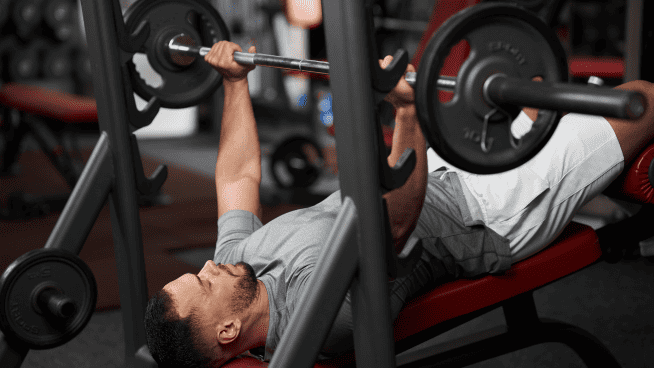![]()
Nine years ago, if you had told me that Ryan Hall would one day be talking about bulking and cutting, and which bodybuilding books he liked best, I’d have said you were out of your mind.
Most people would’ve reacted the same way. After all, back then Hall was at the front of the pack of an American distance running resurgence. The recent grad from Stanford had just become the first American to run a half-marathon in less than an hour, finishing Houston’s 13.1-mile race in 59 minutes and 43 seconds. Later that year, Hall won the U.S. Olympic Marathon Trials in 2:09:02, which remains the event’s record.
But from then on, Hall’s race day performances didn’t live up to his (or his fans’) lofty expectations. He finished in 10th place at the Beijing Olympics. He showed flashes of brilliance in several major marathons, and he ran a 2:04:58—the fastest time ever posted by an American—at the Boston Marathon in 2011. But even on that day he fell short of breaking the tape. (Geoffrey Mutai of Kenya won the event in 2:03:02.)
Gradually, injuries—the bane of many runners—began to take their toll on Hall. He dropped out of several high-profile races, and when he did run, his times grew slower and slower. He recently revealed that in addition to the injuries, he was struggling with chronically low testosterone levels and fatigue—largely due, he said, to high volume of running he’d been doing for so long.
That revelation was paired with Hall announcing his retirement from competitive distance running late last year—a decision that caught many off guard. But even more surprising to his fans and friends was a recent story reporting that Hall had put on more than 40 pounds, most of it muscle, since his retirement.
I’ve worked with Hall on several occasions during the past nine years, first as a video producer at Runner’s World and more recently as an editor at STACK. Throughout that time he’s always been candid and open, so I wanted to hear from him about his switch from the roads to the weight room. The result was the following surreal conversation, in which America’s fastest marathoner talks about his newfound love for the Bench Press—and says plenty of other things I never thought I’d hear.
STACK: I guess I, like many people, was startled by your transition in the past few months. Did you ever think you would have this sort of change?
Hall: I knew that when I stopped running, I would really stop. I’m kind of an all-in or all-out kind of guy. And while I got out of running, I’m still craving physical challenge. That’s just a part of who I am.
But to put this in context, lifting wasn’t something you did when you were running competitively, even when your former coach Terrence Mahon had a pretty significant lifting regimen as part of the program.
I hated doing weights when I was running. I just saw it as kind of a pain in the butt, secondary pain I had to do. I just tried to get it done as fast I could. And now, I just love it. I look forward to it every day, enjoy it, it was really fun.
So what is your goal right now?
Trying to get as big and strong as I possibly can [laughs]. That’s how I describe it to people. I mean, I’m not going to start doing shows and competitions or anything like that. I just want to get big and strong.
Ever since I was a little kid, I’d see big and strong people and I was like, ‘Man, I wonder what that feels like.’ Just to walk around and be big and powerful and stuff. As a runner you get super fit, but we’re just, like, weak at everything. We get sore stirring a pot of beans. I wanted to experience [what strength felt like] for myself.
How long after your retirement did you decide to start lifting seriously?
About one day [chuckles]. I pretty much went straight into it. I was excited for a new challenge.
How would you describe the difference between the running you were doing and the lifting you are doing now?
I find weightlifting to be very different than running. I’m obviously very grateful for the career I had, but after I run, I feel blasted. I feel like taking a nap, and then I feel tired for the rest of the day. After I’ve weightlifted, I feel wired. It’s a life-giving activity rather than a life-draining activity.
Are there any similarities between the type of running you were doing and the lifting you are doing now?
That’s a good question. It’s a similar mindset I would say. Because what I loved about running was just pushing myself. I loved the workouts, I loved the hard days. But those were only like three days per week. Whereas in weightlifting, since you’re changing up the muscles you’re working every day, I’m going as hard as I can six days a week.
I’m never just, like, out there doing an easy weight program. It’s always to failure.
Besides that, there’s not a whole lot. If you’re a good runner, there’s pretty much zero carry over to weightlifting. I was so bad when I started, I was so weak. I was benching, I don’t know, maybe 135 pounds was my max when I started. And now I’m up to 215.
It’s fun to do something where you’re getting better. Because I’ve been trying to get better running for the last four or five years and I haven’t improved at all, even though I’ve been working my tail off. So it’s fun to do something and see improvement so easily.
Where did you find the training plan that you’re following?
Bodybuilding.com. It’s like this Arnold Schwarzenegger-like bulking plan. It wasn’t written by Arnold, but it’s like based on his principles. I also have Arnold’s Encyclopedia of Bodybuilding. I read it cover to cover.
Has anyone been advising you about your workouts?
Besides Arnold?
Did you actually speak to Arnold himself?
[Laughs]. No, but if Arnold reads this and wants to give me a call, I’d certainly let him advise me. But yeah, I mean, no one’s really advising me. I’m just really learning as I go,Can we play a little “then and now,” comparing what you used to do with what you’re doing now?
Yeah, yeah. That’d be fun.

OK, favorite workout: Then and now?
Then was 15-mile tempo run, which I’d do when I was training for marathons. The goal was to hit all of those miles at about 5 minute pace if I was at elevation, or more around 4:50/mile if I was at sea level.
Now I would say my chest and back day is my favorite day.
Why is that?
Because it feels good to bench! I don’t know. There’s a reason why like all guys just like love the Bench Press. It just feels good. You feel strong doing it and you see improvement doing it. And you can throw on quite a bit of weight and just go for it. I like the sensation of it.
What about hardest workout, then and now?
If you do short track intervals, you can feel pretty blasted and beat up afterward. It takes you longer to recover from that. So doing six by a mile, where the goal pace was 4:30 to 4:40 per mile, would always leave me pretty fatigued afterwards. And now I’d say my hardest workout is probably my arms day, when I’m doing shoulders, biceps, triceps. That workout takes a pretty long time—I do it for a good hour and a half to two hours—and my arms just feel like Jell-O afterwards.
What’s a comfortable mile pace for you nowadays?
[Laughs] I think that 8-minute pace is my sweet spot right now. I feel it’s pretty good for me still. Once I get down to a 7-minute pace I’m starting to work a little bit, and 6-minute pace now feels like how 5-minute pace used to feel.What do you eat after workouts, then vs. now?
That’s stayed actually fairly similar. It’s simple carbs and protein. I’m probably taking in a lot more protein now—it used to be about 20 grams of protein at a time, and now I’m at 50. And I eat those 50 at three meals a day, so my protein intake has gone way, way up. And my carb intake has gone down a little bit, actually.
When you tell people about the training you’re doing, how do they respond: then versus now?
[Laughs] I’d say my workouts then were a lot more impressive than they are now. I was at the world-class level for a long time. I was at the very peak of the best guys in the world. I could hold my head a lot higher on the running dream than I can on the weightlifting dream. I’m still slightly embarrassed when I’m in the gym working next to guys who are really strong.What’s next for you?
Right now, I’m actually helping coach my girls’ middle school track team. They’ll be in the finals in a couple weeks, so we’re trying to get the kids ready for that. And then I’m helping Sara get ready for the [U.S. Olympic] track trials. And for me like personally, I’m just trying to shed a little bit of body fat right now. I’m looking forward to the next bulking phase. Bulking is way more fun than cutting.
RECOMMENDED FOR YOU
![]()
Nine years ago, if you had told me that Ryan Hall would one day be talking about bulking and cutting, and which bodybuilding books he liked best, I’d have said you were out of your mind.
Most people would’ve reacted the same way. After all, back then Hall was at the front of the pack of an American distance running resurgence. The recent grad from Stanford had just become the first American to run a half-marathon in less than an hour, finishing Houston’s 13.1-mile race in 59 minutes and 43 seconds. Later that year, Hall won the U.S. Olympic Marathon Trials in 2:09:02, which remains the event’s record.
But from then on, Hall’s race day performances didn’t live up to his (or his fans’) lofty expectations. He finished in 10th place at the Beijing Olympics. He showed flashes of brilliance in several major marathons, and he ran a 2:04:58—the fastest time ever posted by an American—at the Boston Marathon in 2011. But even on that day he fell short of breaking the tape. (Geoffrey Mutai of Kenya won the event in 2:03:02.)
Gradually, injuries—the bane of many runners—began to take their toll on Hall. He dropped out of several high-profile races, and when he did run, his times grew slower and slower. He recently revealed that in addition to the injuries, he was struggling with chronically low testosterone levels and fatigue—largely due, he said, to high volume of running he’d been doing for so long.
That revelation was paired with Hall announcing his retirement from competitive distance running late last year—a decision that caught many off guard. But even more surprising to his fans and friends was a recent story reporting that Hall had put on more than 40 pounds, most of it muscle, since his retirement.
I’ve worked with Hall on several occasions during the past nine years, first as a video producer at Runner’s World and more recently as an editor at STACK. Throughout that time he’s always been candid and open, so I wanted to hear from him about his switch from the roads to the weight room. The result was the following surreal conversation, in which America’s fastest marathoner talks about his newfound love for the Bench Press—and says plenty of other things I never thought I’d hear.
STACK: I guess I, like many people, was startled by your transition in the past few months. Did you ever think you would have this sort of change?
Hall: I knew that when I stopped running, I would really stop. I’m kind of an all-in or all-out kind of guy. And while I got out of running, I’m still craving physical challenge. That’s just a part of who I am.
But to put this in context, lifting wasn’t something you did when you were running competitively, even when your former coach Terrence Mahon had a pretty significant lifting regimen as part of the program.
I hated doing weights when I was running. I just saw it as kind of a pain in the butt, secondary pain I had to do. I just tried to get it done as fast I could. And now, I just love it. I look forward to it every day, enjoy it, it was really fun.
So what is your goal right now?
Trying to get as big and strong as I possibly can [laughs]. That’s how I describe it to people. I mean, I’m not going to start doing shows and competitions or anything like that. I just want to get big and strong.
Ever since I was a little kid, I’d see big and strong people and I was like, ‘Man, I wonder what that feels like.’ Just to walk around and be big and powerful and stuff. As a runner you get super fit, but we’re just, like, weak at everything. We get sore stirring a pot of beans. I wanted to experience [what strength felt like] for myself.
How long after your retirement did you decide to start lifting seriously?
About one day [chuckles]. I pretty much went straight into it. I was excited for a new challenge.
How would you describe the difference between the running you were doing and the lifting you are doing now?
I find weightlifting to be very different than running. I’m obviously very grateful for the career I had, but after I run, I feel blasted. I feel like taking a nap, and then I feel tired for the rest of the day. After I’ve weightlifted, I feel wired. It’s a life-giving activity rather than a life-draining activity.
Are there any similarities between the type of running you were doing and the lifting you are doing now?
That’s a good question. It’s a similar mindset I would say. Because what I loved about running was just pushing myself. I loved the workouts, I loved the hard days. But those were only like three days per week. Whereas in weightlifting, since you’re changing up the muscles you’re working every day, I’m going as hard as I can six days a week.
I’m never just, like, out there doing an easy weight program. It’s always to failure.
Besides that, there’s not a whole lot. If you’re a good runner, there’s pretty much zero carry over to weightlifting. I was so bad when I started, I was so weak. I was benching, I don’t know, maybe 135 pounds was my max when I started. And now I’m up to 215.
It’s fun to do something where you’re getting better. Because I’ve been trying to get better running for the last four or five years and I haven’t improved at all, even though I’ve been working my tail off. So it’s fun to do something and see improvement so easily.
Where did you find the training plan that you’re following?
Bodybuilding.com. It’s like this Arnold Schwarzenegger-like bulking plan. It wasn’t written by Arnold, but it’s like based on his principles. I also have Arnold’s Encyclopedia of Bodybuilding. I read it cover to cover.
Has anyone been advising you about your workouts?
Besides Arnold?
Did you actually speak to Arnold himself?
[Laughs]. No, but if Arnold reads this and wants to give me a call, I’d certainly let him advise me. But yeah, I mean, no one’s really advising me. I’m just really learning as I go,Can we play a little “then and now,” comparing what you used to do with what you’re doing now?
Yeah, yeah. That’d be fun.

OK, favorite workout: Then and now?
Then was 15-mile tempo run, which I’d do when I was training for marathons. The goal was to hit all of those miles at about 5 minute pace if I was at elevation, or more around 4:50/mile if I was at sea level.
Now I would say my chest and back day is my favorite day.
Why is that?
Because it feels good to bench! I don’t know. There’s a reason why like all guys just like love the Bench Press. It just feels good. You feel strong doing it and you see improvement doing it. And you can throw on quite a bit of weight and just go for it. I like the sensation of it.
What about hardest workout, then and now?
If you do short track intervals, you can feel pretty blasted and beat up afterward. It takes you longer to recover from that. So doing six by a mile, where the goal pace was 4:30 to 4:40 per mile, would always leave me pretty fatigued afterwards. And now I’d say my hardest workout is probably my arms day, when I’m doing shoulders, biceps, triceps. That workout takes a pretty long time—I do it for a good hour and a half to two hours—and my arms just feel like Jell-O afterwards.
What’s a comfortable mile pace for you nowadays?
[Laughs] I think that 8-minute pace is my sweet spot right now. I feel it’s pretty good for me still. Once I get down to a 7-minute pace I’m starting to work a little bit, and 6-minute pace now feels like how 5-minute pace used to feel.What do you eat after workouts, then vs. now?
That’s stayed actually fairly similar. It’s simple carbs and protein. I’m probably taking in a lot more protein now—it used to be about 20 grams of protein at a time, and now I’m at 50. And I eat those 50 at three meals a day, so my protein intake has gone way, way up. And my carb intake has gone down a little bit, actually.
When you tell people about the training you’re doing, how do they respond: then versus now?
[Laughs] I’d say my workouts then were a lot more impressive than they are now. I was at the world-class level for a long time. I was at the very peak of the best guys in the world. I could hold my head a lot higher on the running dream than I can on the weightlifting dream. I’m still slightly embarrassed when I’m in the gym working next to guys who are really strong.What’s next for you?
Right now, I’m actually helping coach my girls’ middle school track team. They’ll be in the finals in a couple weeks, so we’re trying to get the kids ready for that. And then I’m helping Sara get ready for the [U.S. Olympic] track trials. And for me like personally, I’m just trying to shed a little bit of body fat right now. I’m looking forward to the next bulking phase. Bulking is way more fun than cutting.










